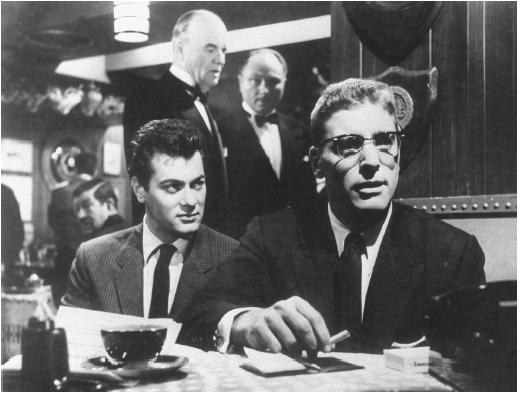The Sweet Smell Of Success - Film (Movie) Plot and Review
USA, 1957
Director: Alexander Mackendrick
Production: Norma-Curtleigh Production; black and white, 35mm; running time: 96 minutes, press screening was 103 minutes. Released 27 June 1957 by United Artists. Filmed Spring 1957 in New York City.
Producer: James Hill, a Hecht-Hill-Lancaster presentation; screenplay: Clifford Odets, adapted by Ernest Lehman, from the short story "Tell Me About It Tomorrow" by Ernest Lehman; photography: James Wong Howe; editor: Alan Crosland, Jr.; sound: Jack Solomon; art director: Edward Carrere; music: Elmer Bernstein.
Cast:
Burt Lancaster (
J. J. Hunsecker
); Tony Curtis (
Sidney Falco
); Susan Harrison (
Susan Hunsecker
); Sam Levene (
Frank D'Angelo
); Barbara Nicholls (
Rita
); Martin Milner (
Steve Dallas
); Jeff Donnell (
Sally
); Joseph Leon (
Robard
); Edith Atwater (
Mary
); Emile Meyer (
Harry Kello
); Joe Frisco (
Herbie Temple
); David White (
Otis Elwell
); Lawrence Dobkin (
Leo Bartha
); Lurene Tuttle (
Mrs. Bartha
); Queenie Smith (
Mildred Tam
); Autumn Russell (
Linda
); Jay Adler (
Manny Davis
); Lewis Charles (
Al Evans
).
Publications
Books:
Silver, Alain, and Elizabeth Ward, editors, Film Noir , New York, 1979.
Hunter, Allan, Burt Lancaster: The Man and His Movies , Edinburgh, 1984.
Lacourbe, Roland, Burt Lancaster , Paris, 1987.
Kemp, Philip, Alexander Mackendrick , London, 1989.
Kemp, Philip, Lethal Innocence: The Cinema of Alexander Mackendrick , London, 1991.
Articles:
Cutts, John, in Films and Filming (London), June 1957.
Weiler, A. H., in New York Times , 27 June 1957.
Tallmer, Jerry, in Village Voice (New York), 28 August 1957.
Films in Review (New York) August-September 1957.
Prouse, Derek, in Sight and Sound (London), Autumn 1957.
Rittgers, Carol, in Film Culture (New York), October 1957.
"Alexander Mackendrick," in Films and Filming (London), January 1963.
Sarris, Andrew, "Oddities and One-Shots," in Film Culture (New York), Spring 1963.
Schuster, Mel, "Burt Lancaster," in Films in Review (New York), August-September 1969.
"Mackendrick Issue" of Dialogue on Film (Washington, D.C.), no. 2, 1972.
Blackburn, Richard, "Bullies of Broadway," in American Film (Washington, D.C.), December 1983.
Denby, D., "The Best Movie," in New York Magazine , vol. 18, 23/30 December 1985.
Kemp, Philip, "Mackendrick Land," in Sight and Sound (London), vol. 58, no. 1, Winter 1988–89.
Denby, D., "The Lullaby of Broadway," in Premiere (Boulder), vol. 4, April 1991.
Lane, Anthony, "No Illusions: Movie Director Alexander Mackendrick," in New Yorker , vol. 69, no. 48, 31 January 1994.
Buford, K., "Do Make Waves: Sandy," in Film Comment (New York), vol. 30, no. 3, May-June 1994.
Hoberman, J., "Once Upon a Time in Times Square," in Village Voice (New York), vol. 39, 22 November 1994.
Reid's Film Index (Wyong), no. 30, 1997.
Roddam, Franc, "Power, Corruption and Lies," in Sight and Sound (London), vol. 7, no. 1, January 1997.
Dzenis, A., in Metro Magazine (St. Kilda West), no. 113/114, 1998.
* * *
One of the most original and off-beat films to be labelled a film noir , The Sweet Smell of Success takes a cynical bite at the underbelly of the New York publicity game. As Sidney Falco, a thoroughly ruthless and utterly amoral press agent scrambling for his place in the sun, Tony Curtis gives the performance of his career—charming yet sleazy, ingratiating yet duplicitous. Falco aspires to a position of influence in the orbit of J. J. Hunsecker, king of the gossip pen. As impeccably played by Burt Lancaster, Hunsecker is a smooth, cold-blooded mudslinger; crewcut, single and implicitly gay; more ruthless than Falco, yet completely unsullied. The bittersweet irony of the film is that, for all of Falco's slimy dealings, it is he (and his type) who ends up doing Hunsecker's dirty work.
To curry Hunsecker's favor, Falco sets out to break up the relationship between the columnist's sister (to whom Hunsecker has more than a brotherly attachment) and a young jazz musician by circulating accusations that the musician is a Communist and a drug

—Ed Lowry
Comment about this article, ask questions, or add new information about this topic: